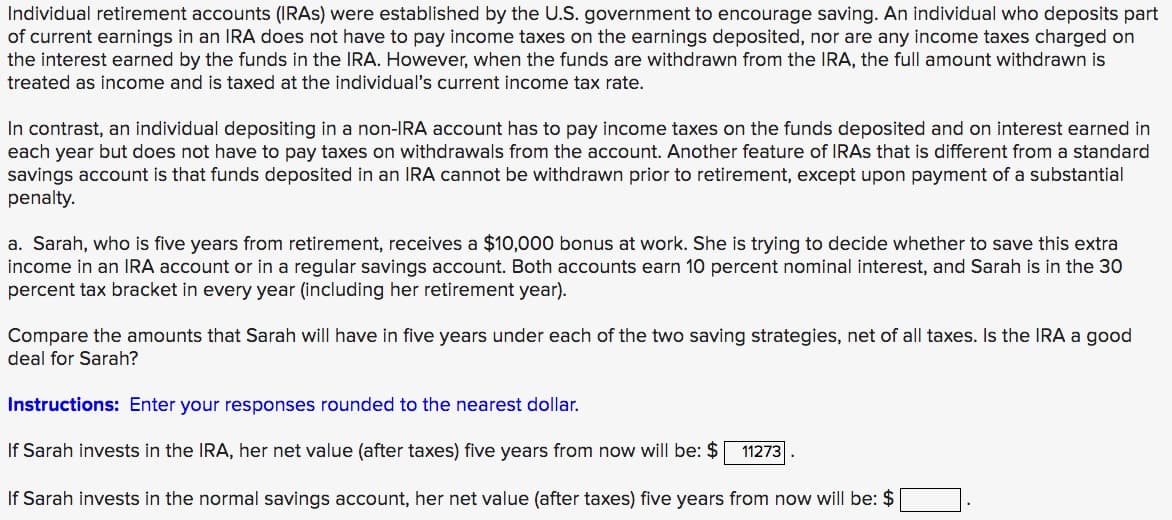Individual retirement accounts (IRAS) were established by the U.S. government to encourage saving. An individual who deposits part of current earnings in an IRA does not have to pay income taxes on the earnings deposited, nor are any income taxes charged on the interest earned by the funds in the IRA. However, when the funds are withdrawn from the IRA, the full amount withdrawn is treated as income and is taxed at the individual's current income tax rate. In contrast, an individual depositing in a non-IRA account has to pay income taxes on the funds deposited and on interest earned in each year but does not have to pay taxes on withdrawals from the account. Another feature of IRAS that is different from a standard savings account is that funds deposited in an IRA cannot be withdrawn prior to retirement, except upon payment of a substantial penalty. a. Sarah, who is five years from retirement, receives a $10,000 bonus at work. She is trying to decide whether to save this extra income in an IRA account or in a regular savings account. Both accounts earn 10 percent nominal interest, and Sarah is in the 30 percent tax bracket in every year (including her retirement year). Compare the amounts that Sarah will have in five years under each of the two saving strategies, net of all taxes. Is the IRA a good deal for Sarah? Instructions: Enter your responses rounded to the nearest dollar. If Sarah invests in the IRA, her net value (after taxes) five years from now will be: $ 11273 If Sarah invests in the normal savings account, her net value (after taxes) five years from now will be: $
Individual retirement accounts (IRAS) were established by the U.S. government to encourage saving. An individual who deposits part of current earnings in an IRA does not have to pay income taxes on the earnings deposited, nor are any income taxes charged on the interest earned by the funds in the IRA. However, when the funds are withdrawn from the IRA, the full amount withdrawn is treated as income and is taxed at the individual's current income tax rate. In contrast, an individual depositing in a non-IRA account has to pay income taxes on the funds deposited and on interest earned in each year but does not have to pay taxes on withdrawals from the account. Another feature of IRAS that is different from a standard savings account is that funds deposited in an IRA cannot be withdrawn prior to retirement, except upon payment of a substantial penalty. a. Sarah, who is five years from retirement, receives a $10,000 bonus at work. She is trying to decide whether to save this extra income in an IRA account or in a regular savings account. Both accounts earn 10 percent nominal interest, and Sarah is in the 30 percent tax bracket in every year (including her retirement year). Compare the amounts that Sarah will have in five years under each of the two saving strategies, net of all taxes. Is the IRA a good deal for Sarah? Instructions: Enter your responses rounded to the nearest dollar. If Sarah invests in the IRA, her net value (after taxes) five years from now will be: $ 11273 If Sarah invests in the normal savings account, her net value (after taxes) five years from now will be: $
Chapter6: Business Expenses
Section: Chapter Questions
Problem 51P
Related questions
Question
I just need help with the second question with the blank box.

Transcribed Image Text:Individual retirement accounts (IRAS) were established by the U.S. government to encourage saving. An individual who deposits part
of current earnings in an IRA does not have to pay income taxes on the earnings deposited, nor are any income taxes charged on
the interest earned by the funds in the IRA. However, when the funds are withdrawn from the IRA, the full amount withdrawn is
treated as income and is taxed at the individual's current income tax rate.
In contrast, an individual depositing in a non-IRA account has to pay income taxes on the funds deposited and on interest earned in
each year but does not have to pay taxes on withdrawals from the account. Another feature of IRAS that is different from a standard
savings account is that funds deposited in an IRA cannot be withdrawn prior to retirement, except upon payment of a substantial
penalty.
a. Sarah, who is five years from retirement, receives a $10,000 bonus at work. She is trying to decide whether to save this extra
income in an IRA account or in a regular savings account. Both accounts earn 10 percent nominal interest, and Sarah is in the 30
percent tax bracket in every year (including her retirement year).
Compare the amounts that Sarah will have in five years under each of the two saving strategies, net of all taxes. Is the IRA a good
deal for Sarah?
Instructions: Enter your responses rounded to the nearest dollar.
If Sarah invests in the IRA, her net value (after taxes) five years from now will be: $
11273
If Sarah invests in the normal savings account, her net value (after taxes) five years from now will be: $
Expert Solution
This question has been solved!
Explore an expertly crafted, step-by-step solution for a thorough understanding of key concepts.
This is a popular solution!
Trending now
This is a popular solution!
Step by step
Solved in 3 steps with 2 images

Knowledge Booster
Learn more about
Need a deep-dive on the concept behind this application? Look no further. Learn more about this topic, finance and related others by exploring similar questions and additional content below.Recommended textbooks for you









Individual Income Taxes
Accounting
ISBN:
9780357109731
Author:
Hoffman
Publisher:
CENGAGE LEARNING - CONSIGNMENT